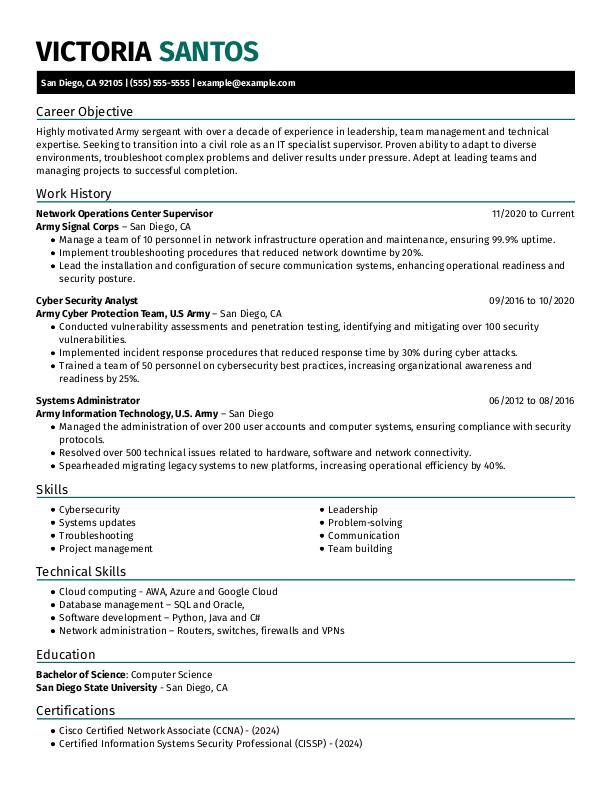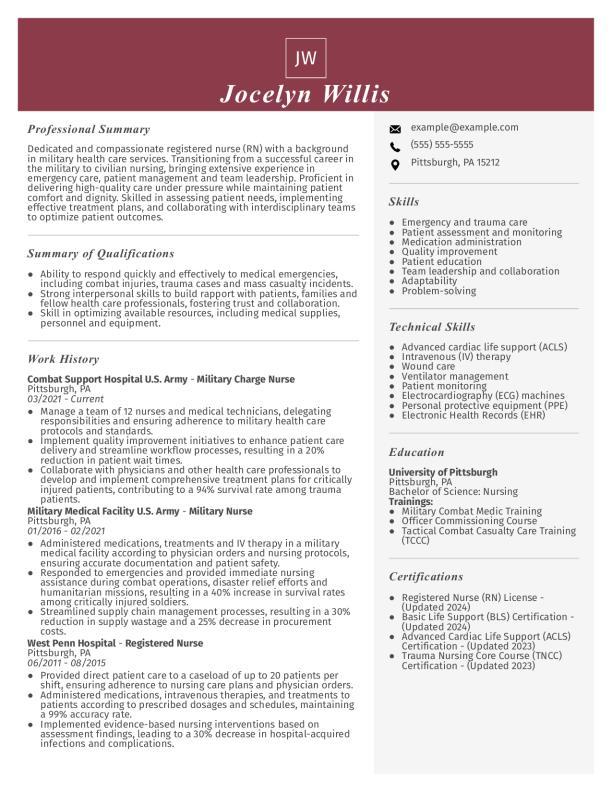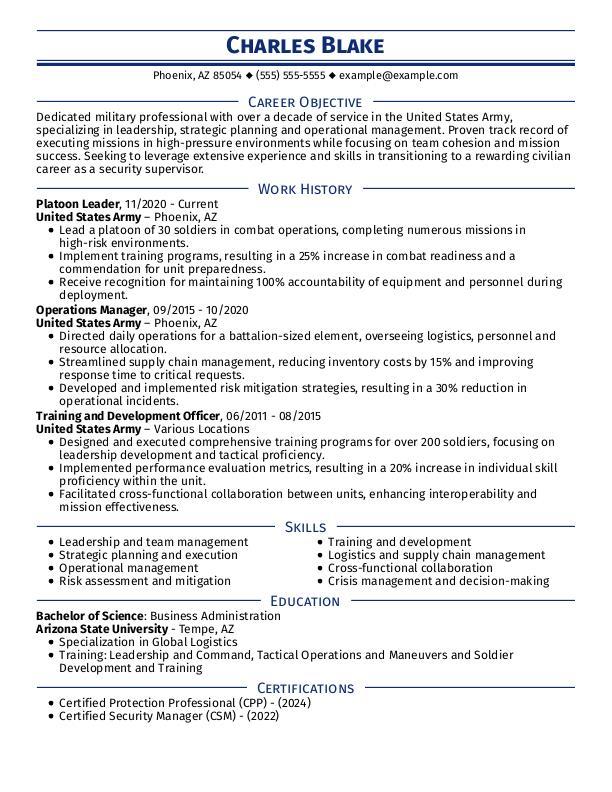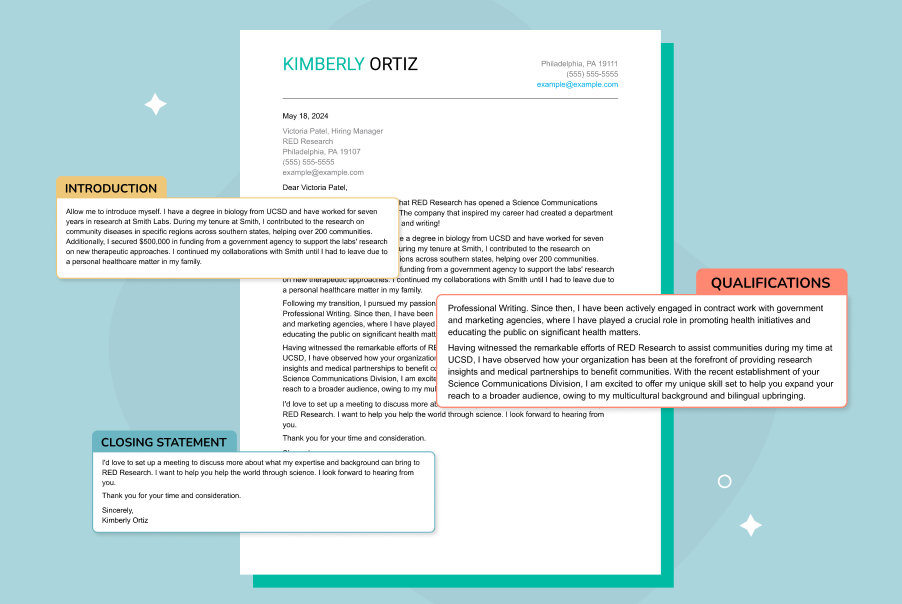Our customers have been hired at: *Foot Note
A military career has given you the skills and experience to build a great career. We can help you create a resume that effectively communicates your skills and experience to potential civilian employers. Whether you are just beginning your job search or looking to take the next step in your career, a military resume guide is an essential resource that can help you achieve your goals and successfully transition to civilian life.
This guide gives you the tools you need to translate your military experience into civilian-friendly language, showcase your skills and accomplishments, and effectively market yourself in the job market.
In this guide, we’ll show you:
- Expert military resume samples
- Step-by-step military resume writing guide
- Innovative tools & AI to craft your military resume
- Essential tips for a successful military-to-civilian transition
- Valuable resources for your civilian career journey
Table of Contents
Get started with MyPerfectResume today!
- Build a resume on any device
- Pick an ATS-friendly template
- Tailor with AI copy suggestions
Simplify your resume creation process with our wide selection of editable resume templates, perfect for any job seeker.
Difference between a military and civilian resume
Transitioning from a military career to a civilian one requires more than just translating military jargon into civilian language. The structure and content of a military resume differ significantly from that of a civilian resume.
These are the main differences between a military resume and a civilian resume:
- Length: A military resume is detailed, including important military career information such as unit, locations, ranks, branches served, duties, award and achievements. This information alone and lengthen the resume. A civilian resume is one to two pages long, focusing only on job-relevant qualifications.
- Skills: A military resume must highlight your military job duties and responsabilitis. Meanwhile, a civilian resume will be focused on the job-relevant skills the candidate brings to the table, not their entire skill set.
- Terminology: The armed forces have their own language. The Department of Defense even created a dictionary, including acronyms. A military resume can use these terms, but a civilian resume simply uses professional English language.
- Formatting: Military resumes tend to be more uniform and structured, while civilian resumes allow for more creativity and flexibility in terms of format and layout. In both instances, the resume must keep a professional layout.I 2I 2I Hi 111122
Understanding these differences can be a critical step in achieving your career goals and in preparing your military to civilian transition resume.
Military-to- civilian resume examples
These military to civilian resume examples show you how it can be done. Looking for an example in a specific industry? Our resume examples collection has them.
Careers for your military to civilian transition
Make a resume with MyPerfectResume
Our Resume builder can help you write the perfect resume. Start Now!
How to write a military to civilian resume
Writing a military resume requires a unique approach to effectively showcase your skills, experiences and qualifications gained during military service. While you will receive the required documentation to write a resume, this quick guide will help you create a winning military to civilian resume.
- Write a compelling professional summary
If the recruiter reads nothing but the top of your military resume, which information from your career history will grab their attention? A professional summary is your introduction to the hiring manager. It uses three to five sentences to present yourself, your years of experience, expertise and an important accomplishment — or two! As a professional in transition, you can also include a sentence stating your future plans or the role you’re seeking.
For example:
- Build a work history using civilian terminology
Your work experience section is essential in your military transition resume. It will show a potential employer what you can do. Whether you name it professional history or work experience, it must include your relevant experience, the position name and employment dates.
A key component of your military to civilian resume will be your Verification of Military Experience and Training, or VMET, which helps you translate your skills and experience from the armed forces to the civilian workforce.
The VMET is a thorough document outlining your entire military career and it will include an equivalent to use in your resume. For example:
Dates: June 2021 - Present (2 years 8 months)
Organization: US Army, 1st Infantry Division, 2nd Brigade Combat Team, Alpha Company
Location: Fort Hood, TX
Title: Infantry Company Operations Officer (S3)
- Conducting mission planning and briefings for offensive, defensive and stability operations (equivalent to project management and logistics planning).
This VMET entry can translate to:
Infantry Company Operations Officer
US Army
Jun 2021 - Current
- Planned, executed, and briefed offensive, defensive and stability operations, aligning with civilian project management and logistics planning.
- Skills
The skills section of a military to civilian resume is a crucial component that showcases the unique abilities and experiences acquired during military service. Transitioning from the military to the civilian workforce requires effectively translating military skills into marketable qualifications that employers can understand and appreciate.
Once again, use your VMET and choose 6 to 10 skills for a resume that works best with your application. Analyze the job description and emphasize the skills that are most relevant to the position, ensuring that you present yourself as a strong candidate.
- Education and Training
The education section of a military to civilian resume should highlight academic qualifications, specialized military training, relevant coursework and academic honors or awards. List degrees and certifications obtained, along with the name of the institution and date of completion. Mention coursework or training that demonstrates proficiency in a specific field or industry and any academic honors or awards received.
It's essential to include any specialized military training or certifications applicable to the civilian job you're applying for. Lastly, if you're still pursuing a degree or certification, mention it, along with the expected date of completion. An effective presentation of education demonstrates commitment to continuous learning and professional growth.
Military to civilian resume objective examples
A well-crafted resume effectively communicates how your military background aligns with your desired civilian career path. These examples highlight how to combine your military years of experience and job-relevant skills to show the qualifications you bring to the table.
Transitioning military leader with 15 years of experience in aviation seeking to apply strong analytical and decision-making skills to a challenging Operations Manager role in the airline industry.
Dedicated and resourceful former Marine Corps veteran with a passion for logistics. Seeking to utilize leadership skills, supply chain management expertise, and a strong work ethic to contribute to a meaningful role in the transportation and logistics industry.
Recent Army veteran seeking to utilize infantry experience and expertise in team building and risk assessment in a law enforcement role.
Highly motivated to utilize leadership, problem-solving, and strategic planning skills gained in the military for a successful career in management consulting.
Recent Chief Warrant Officer with 8 years of experience in aviation seeking to utilize expertise in resource planning and process optimization in an Operations Manager role in the airline industry. Possess strong communication, teamwork, and adaptability skills acquired through military service.
Seeking to leverage 10 years of military experience in logistics to secure a Supply Chain Manager position within a reputable manufacturing company.
Highly motivated to translate military experience in mechanical engineering and skills in project management, problem-solving, and teamwork to a meaningful role within the manufacturing industry.
Retired Military Sergeant with expertise in human resources seeking to utilize leadership, team management, and communication skills in a corporate HR role.
Seeking to transition military skills in project management, team leadership, and communication to a challenging role in the IT industry field.
To translate 10 years of experience as a cybersecurity specialist in the US Air Force into a Cybersecurity Analyst position leveraging my proficiency in network security, risk management, and incident response. Committed to contributing a strong work ethic and a results-oriented approach.
Career tools for your military to civilian transition
When transitioning from military service to a civilian career, having the right tools at your disposal can make all the difference. Counseling services provided by the military or civilian organizations can help you identify your career goals and create a transition plan.
- MyPerfectResume’s Resume Builder — Find prewritten bullet points and resume templates specifically designed for transitioning military personnel. With user-friendly features, it helps create a professional resume that highlights transferable skills and boosts your chances of landing a civilian job. Plus, you can confirm your military transition resume works using the ATS Resume Checker.
- American Job Centers — A valuable resource for military personnel transitioning to civilian careers. They offer job search assistance, career counseling and training programs to help with the transition process.
- CareerOneStop — An online portal that provides a wide range of resources, including career exploration tools, job search assistance, and information on training and education programs.
- Department of Defense Credentialing Opportunities On-Line — Helps service members translate their military skills into civilian credentials and certifications, making them more competitive in the job market.
- HIRE Vets Medallion Program— Recognizes employers who hire and support veterans, providing a valuable resource for job seekers.
- Transition Assistance Program (TAP) — Provides comprehensive transition assistance to service members, offering workshops, counseling and resources to help them successfully transition to civilian life.
- VA Solid Start — A program that ensures transitioning service members receive personalized support and resources from the Department of Veterans Affairs to promote a successful transition into civilian life.
In addition to the government resources, you can find private and non-for-profit assistance like:
- American Corporate Partners— A non-profit organization that offers mentoring and career development programs for veterans. This program pairs veterans with corporate professionals who provide guidance and support as they transition to the civilian workforce.
- American Legion — Provides a range of services to veterans, including job search assistance, education benefits and advocacy. It is one of the largest veterans organizations in the United States.
- Veterans of Foreign Wars (VFW) — It has a range of services to veterans, including job search assistance, education benefits and advocacy as well as the VFW Transition and Employment Resource Center.
These are only a few examples of the organizations that can help you translate your military experience into a successful civilian career. Combine their knowledge with our Resume Builder for a smoother transition in your career.
Stay ready in your job seeking process with our Ultimate Job Interview Guide. Learn about the 10 most common job interview questions, what to ask and how to prepare for the big day.
Make a resume with MyPerfectResume
Our Resume builder can help you write the perfect resume. Start Now!
Tips to build your military-to-civilian resume
- Choose a military resume template to fit your information and show your professional style.
- Figure out your next step. Customizing a resume for its intended purpose improves your chances of getting noticed. There is no need to figure out your entire career immediately, just what you’ll be using your resume for.
- Use civilian-friendly language and avoid military jargon. Focus on highlighting skills such as leadership, teamwork, problem-solving and adaptability.
- Include quantifiable accomplishments in your experience section to show how successfully you’ve used your skills.
- Take advantage of civilian transition programs. The Veterans Affairs Department is dedicated to assist you in life after the armed forces, including figuring out employment. Don’t limit yourself to just the VA. Use other resources, like the Department of Labor’s CareerOneStop, Veterati, American Corporate Partners’s Mentoring program, among others.
- Start working on your transition to the civilian side 18 months before it happens. This will allow you to request all the necessary documentation to help you build a resume and find your next step.
- Learn from resume examples for different industries. A resume example can show you how a good resume looks and what it includes, as well as finding a military resume template to fit your personality during your civilian transition.
- We also recommend exploring our guide on adapting a federal resume for private-sector roles for additional tips and examples.
Key takeaways
- A military resume is a key component in your transition to civilian resume.
- Request your VMET document before you start working on your military resume. It’ll help you translate military terminology to the civilian workforce.
- Tailor your resume to the application. Whether you’re using the resume to apply for a job or complete a college application, use the application guidelines to customize your military transition resume.
- Use the available tools, like our Resume Builder, to write your military resume confidently and backed by professional guidance.
- A resume builder can also take out the guesswork when it comes to your military resume template. It will automatically adjust your content to fit your template and allow you to customize as you go.
- Find all available resources to help ease your transition into the civilian workforce: from official government channels to private assistance and mentorship programs. Understanding your next step will help you create a military to civilian transition resume that works.
Make a cover letter with MyPerfectResume
Our Cover letter builder can help you write the perfect cover letter. Start Now!
FAQ
How to put military experience on a resume?
To put your military experience in your transitional resume, you must request your VMET. This document will help translate your military experience to civilian terms. Plus, it’ll show exactly which hard skills you developed through your armed forces career.
How to convert military work into a civilian resume?
To translate your military experience into civilian, follow your VMET document. It will provide you with a thorough description of your role in the armed forces, including the skills learned or used for each job. It will also include the American Council of Education (ACE) accreditation recommendations — if available. Before you start writing, understand the job requirements to tailor your military to civilian resume accordingly.
How to list military experience on a resume older than 10 years?
Resumes should only include the last 10 years. However, if you want to include your military experience, keep it to one entry with your highest rank and include three bullet points with your strongest achievements. You can write more than one sentence per bullet point to showcase your military experience and accomplishments.
What document can I use as my resume when I get out of the military?
You will create a resume when leaving the military. The document that will help you write a military to civilian resume is the VMET. It will contain every single skill, ranking, experience, education and completed training obtained when you were in active duty. It is incredibly useful in translating military terminology to the civilian world.
How long is a military resume?
A military to civilian resume is one or two pages long, just as any other resume. Remember, you are not writing a resume to fit all your applications. You must tailor a resume for every single application to show the hiring manager your job-relevant qualifications. A resume builder can help you quickly adjust your military transitional resume while saving previous iterations to edit again and again.
Should I put my military experience on my resume?
Yes! Military service is a great asset to any career, whether in the private, public or non-profit sector. It will show your commitment, leadership and teamwork skills, which are essential in all industries. We also recommend exploring our guide on how to list security clearance on a resume to stand out to employers.
Our customers have been hired at:*Foot Note








